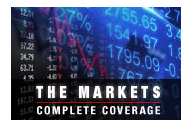Relief should bring about a relief rally, right? Wednesday’s stock-market rebound in the Standard & Poor’s 500-stock index looked like it had sputtered to a halt during Thursday’s morning trading, but the index managed to finish the day up 0.67 percent, at a new record high.
The rally didn’t extend to the Dow Jones Industrial Average, which closed flat thanks to depressing earnings releases from the likes of IBM and new Dow component Goldman Sachs.
The markets might not have been overly rattled by the brinksmanship in Washington, but they were clearly comforted by the deal to end the more than two week-old shutdown and avert the prospect of the United States defaulting on its debt. The spectacle would have been one for the history books: a sovereign nation with the resources to continue to fund its obligations deciding instead to self immolate. That said, this is the kind of history that no one wants to experience, at least if they have the slightest iota of common sense.
But the D.C. deal is only another temporary fix, of the kind that Russ Koesterich, chief investment strategist at BlackRock, described as a “minimalist solution which avoids catastrophe.” The inability to reach a more lasting agreement – and even more significantly, to send a signal to financial markets worldwide that Congress can be trusted to behave in a rational manner going forward – was the principal reason for the market’s early “morning after” mode and the dollar’s plunge.
There are other reasons, too. First among them is that economists now must estimate how much the shutdown will have cost the U.S. economy by the time government departments and spending are back up and running. Right now, the only safe answer is "billions of dollars." It’s not as if the economy was in robust shape before the shutdown, either. The first estimate of third-quarter GDP came in at a disappointing 1.4 percent. So much for the second-half recovery that economists confidently predicted at the beginning of the year.
Unsurprisingly, corporate earnings aren’t delivering what analysts and investors had been hoping for. Even more significantly, growth in revenue is increasingly AWOL, a trend that I noted at this time last year. Since then, the revenue problem has become increasingly noticeable. Today alone, several major companies – IBM, Goldman Sachs, eBay and UnitedHealth Group – saw their stocks plunge anywhere from 2.5 percent to 6 percent in response to revenue declines or shortfalls.
That’s an issue because it means companies have to continue to try to squeeze out earnings growth by cutting costs, and it’s a warning about just how significant a toll the shutdown may end up taking on corporate profits. The shutdown means that thousands of furloughed workers might have held off buying clothing, going to movies or replacing their smartphones with the latest model this month. And the ongoing brinksmanship in Washington may make already-wary Americans place a greater emphasis on value, squeezing corporate profit margins further still.
In contrast, the bond market bubble gained a few extra months of life. It’s hard to imagine Fed policymakers gambling on tapering off their support for the economy amidst the current uncertainty if they couldn’t think of doing so at their previous meeting.
So, investors are left with relatively unpalatable options: Buy stocks in hopes that the economy will somehow pick up the pace of its growth? Allocate money to bonds in spite of the pockets of over-valuation in that market and in spite of the recent reminder that bond market funds, too, can experience big losses?
These are the points that market participants must ponder as members of Congress pat themselves on the back for reaching an agreement. And if anyone really expects 2014 to bring with it a miraculous end to bitter and even vicious partisan battles in Congress, enabling the country to move forward and markets to focus on fundamentals once more, I confess I would wonder what illicit substances they have been consuming.
Most significantly, shenanigans like those we have witnessed in Washington undermine trust in not just our government institutions but our entire system of governance, as an opinion piece for Xinhua, China’s state news agency, pointed out earlier this month. Given the difficulty U.S. politicians have had in “striking a viable deal to bring normality to the body politic they brag about, it is perhaps a good time for the befuddled world to start considering building a de-Americanized world,” its author wrote.
While the editorial has its own biases, the bizarre spectacle of Americans taking a sledgehammer to their own credibility is likely to inspire agreement with its broader points among a not-insignificant chunk of the global investment community. The fact is, those observers can understand the idea of default if it’s unavoidable – if there simply isn’t the ability to raise money to pay off an obligation. What they find bemusing or perplexing is the idea that political leaders could sacrifice pragmatism to such an extent that they’d risk their country becoming a laughing-stock.
True, some of these foreign investors don’t have governments that you and I would consider to be models of democracy. But after the last couple of weeks, can we blame them for thinking the same about us?







